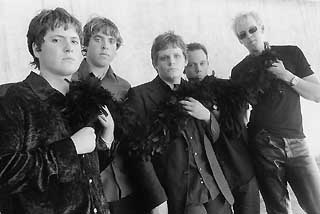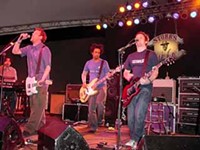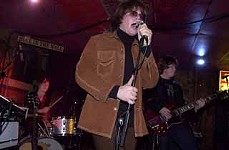The Ego Has Landed
The Love Supreme Goes Off the Record
By Mindy LaBernz, Fri., April 28, 2000

A journalist once asked Noel Gallagher to sum up Oasis in one word. Beer in hand, he looked squarely into the camera and smirked, "Me." While this brand of staggering self-belief is as captivating to some as it is repugnant to others, one thing is certain: It's often the key to blinding success. But where do these egos come from? Austin is packed with egos -- musicians, to be more precise -- most of which anchor unknown local bands. The story of the Love Supreme will eat at those very same delicate egos, because this, of course, should be their story. Why not them? They put up the flyers, they make the phone calls, they work the shit day job. Why is this local band any different from their own?
Fair enough questions, but do they really believe it? Do they believe it so much that the audience has no choice but to believe it, too? So much that the listener must either despise them or fall fawning at their feet? Are their egos young and blustering -- confident in every pronouncement? Do their egos speak for themselves like, say, this one?
On indie rock: I hate it. It's a cycle that perpetuates mediocrity. It's a self-help network: "I'll come see your band, if you see mine, but let's not get too good at this."
On D-I-Y: Isn't that a venereal disease?
On funny music: I have a real problem with funny music.
On the fact that his stage persona is so amusing: Because I'm a sexy bitch, and we're so amusingly good.
On rehearsing: Anytime we do anything, it's perfect.
On SXSW: We were monsters, we were fucking outrageous.
On his band's former fans: Dirt-foot hippies.
On his band: You have to fucking care about their fucking feelings -- I'm very Nieztschean about my band.
On how this story should begin: I think maybe we should structure this around a quote I recently read from Caligula: "Let them hate me, so long as they fear me."
Noah Lit, proprietor of the above ego, suffers no guilt about his band being written about. When asked why the Love Supreme deserves it, the singer picks up the journalist's tape recorder and speaks very distinctly.
"Because very few people make important music these days."
By "important," Lit isn't referring to lyrical content or elite chord progressions or groundbreaking sonic experimentation. His definition of "important" is grandiose musical gestures. And his band, the Love Supreme, having recently released their self-titled second album, flaunt their importance: strings by Suede, executed on the band's very own Mellotron; vocals with stadium-rock power, but in love with the whispering melodrama of Pulp's Jarvis Cocker; a guitarist with posh gear, who's inspired by Mick Ronson (Mott the Hoople/Bowie) and George Harrison, but appalled by Eric Clapton.
"But listen," protests Lit. "I don't want to get too caught up in this Anglophile thing. We don't fall into the normal Britpop thing. I don't sing with a British accent. We don't wear make-up."
"We just try to put a Beatles quote or a Bowie quote in every song," quips bassist Jesse Ingalls.
Lit doesn't apologize.
"If you're going to rip off, you might as well rip off the best," he contends
Drummer Tripp Wiggins tells Lit he needs a shirt that says "Plagiarist."
"I would so wear it," Lit says wistfully.
"Noel Gallagher was wearing one in Q," Wiggins explains. "That's why I said it. He thinks of everything first."
Lit is quick to retort, "Or second!"
Gathered around a table, the group has convened for an interview -- one week after Lit has had his own private audience with the interviewer. A graduating UT philosophy major, he articulates his opinions well and unflinchingly. It's no coincidence that Gallagher comes up so often; Lit believes he's one of the few people alive to defend Oasis' claim that they're better than the Beatles.
"I don't agree with them," he states, "but I certainly appreciate the sentiment. What are you going to say? People keep accusing you of ripping them off, so if you're gonna go, you might as well go all the way."
With Gallagher's name and personality cropping up so naturally alongside Lit's, the subject of a lead singer's ego seems an easy subject. In his interview, the singer called his ego "the longest running joke in this band." The band listens to this contention as it's repeated and reacts with uncomfortable silence. Lit laughs and addresses his bandmates.
"That's right, isn't it? It's a total joke."
Nick Preston, the quiet guitarist, deadpans, "Your ego is a joke?"
More silence. More eyes on the table, around the room. Wiggins, who's been hitting Lit (off the record) since the interview started, laughs while trying to come up with the "right way" to phrase his reply. Finally, Ingalls speaks.
"Noah's the kind of guy who has an ego even if there's no substantiation for it. Even before we had songs of any kind -- like when I joined the band -- we were playing Santana, and he still had an ego. And he couldn't even solo. He couldn't even play back then."
Lit is clearly appalled.
"That Santana stuff is off the record."
Actually, Lit freely admits to his musical deficiencies. In fact, he prides himself on this deficiency, while the others firmly claim to be musicians. Ingalls, a music major, even aspires to a doctorate in bass.
"OFF ... THE ... RECORD," Lit says with exasperation.
Preston points out "that guy from the Grateful Dead" received his doctorate as Ingalls reverses the attack by revealing that some of his muso cohorts laugh when he mentions he still plays with Lit. The notion elicits an Amadeus-like giggle of victory from Lit, suggesting he thinks that derision from some whip-fast guitar technician from the North Texas music program is --
"Is awesome!" proclaims Lit.
"People laugh at you, Noah?" asks Preston.
"I laughed at Friday the 13th," retorts Lit. "Because I was afraid."
Musicianship aside, keyboard player Phillip Edwards claims the Love Supreme initially came together less as musicians with a coherent vision and more as friends with disparate tastes. When tastes differ, a few things can happen: 1) a democratic melding of styles and tastes, 2) deference to the songwriter's vision, or 3) band implosion.
Being young, early 20s for most, they didn't realize a band is no place for a democracy, so they chose option No.1. What followed were long solos and the dreaded "jam band" designation. Wiggins, who joined the band between the first and second album, describes the difference between the band now and then as a "14-song set versus a four-song set."
Those four songs created a strong fan base that came out in droves to the Mercury Lounge's previous location. According to Lit, the gigs were always packed. The typical Austin trajectory should have included growing crowds necessitating a residency and resulting in consistent cash flow for the musicians, but when the band decided to make an album, scenario No.2 materialized: The songwriter's vision won out.
"When we were recording the first album," explains Edwards, "certain members wanted to go more in a song direction, and certain members wanted to go in more of a jam direction. Eventually we all had a talk outside of AMN, and we said we're all going to start backing up Noah and doing his songs and stop doing covers."

"You know, be like a real band," laughs Ingalls.
The conversation meanders around the "new direction" until Lit gets fed up.
"We sat down and said, 'Look, we want to be a pop band. We don't know how we're going to do it, and we're probably going to wind up losing all of our fans.'"
In making the transition, the band lucked out by finding producer Lars Goransson, a displaced Swede with a heavy metal name and foppish musical inclinations. While producing the band's first LP, On My Side, Goransson exposed the group to the musically glamorous side of rock history, and viola! Focus, vision, panache. Gorannson can even explain the seemingly sketchy flip-flop in style.
"Noah knew that what they were doing was wrong before we even started recording," he says. "We spent many nights on the phone discussing what it means to be a pop band.
"I remember one night, he couldn't get into Lovejoy's because he was only 20, so we went to the Ritz. 'Back in the USSR' came on, and he just shone like the sun. He had the complete Beatles understanding. That's when I knew he really wanted to step away."
When asked to reveal his Svengali powers in the studio, Gorannson, who speaks dramatically and always in superlatives, has an anecdote ready.
"They had this epic known as 'Rhapsody,' and it was a horrendous. Eleven minutes long, and they actually recorded the whole thing at the sessions. Put it down on tape. And overdubbed, I might add. It was easily 45-50 minutes long when they played it live -- it's as long as their set is now. So when it came time for mixing, the daily question would always be, 'What about 'Rhapsody?'"
Apparently, Gorannson conveniently "forgot" about the track every day, or pushed it back until they had no time left. The song never made it to their debut, an effort Lit likens to the Animals.
"I guess we were an American band trying to sound like a British band trying to sound like an American band."
As much as that concept seems workable live, it still disinterested their fans.
"By the first album, we were already losing our audience," says Lit. "We were playing songs. They were kind of low and bluesy, or whatever, but the fans didn't want anything to do with that. They want a band they don't have to think about, that they can just drink to and look at girls."
"We predicted it would happen," agrees Ingalls. "In, like, two shows people were unimpressed. People just wanted to dance. We still get requests for 'Boneyard Shimmy.'"
"Boneyard Shimmy"?
"That's off the record," says Lit immediately. "That is so off the record. I was young. I needed the money."
After their two-night record-release bash, their draw dwindled considerably. One year later, when they put out their far superior, far poppier second album right before SXSW 2000, only a handful of friends showed up for the band's Tower Records in-store.
"Our draw went from about 200 to negative 200," sighs Ingalls. "Eventually, we actually had to pay the bar to let us play."
Not really, but it's healthy they can find humor in their plummeting audience participation. With the type of optimism generated only in young bands, the Love Supreme believe the solution lies with radio.
"That's where the pop listeners find who they like, much more so than going out to venues drinking beer," posits Edwards.
Therein lies the problem, of course: "Drinking beer" is precisely what bars want a band to inspire. Hence it seems paradoxical, nay, even suicidal, to try to be both a pop band and a profitable live band. It's as if an inverse relationship exists between a band's ability to write good songs and its ability to get people into a club. Wiggins agrees.
"I've been playing music in this town for seven and a half years now, and we know how hard it is for any pop band to get a draw," he says. "I mean, look at Fastball."
Certainly it took mega radio smash "The Way" to get locals to a Fastball show; back when the local trio were known as Magneto USA, forget about it. Even their explosive debut as Fastball couldn't clear out the crickets. The other truly dazzling Austin pop band, Cotton Mather, have slowed their local appearances to a trickle thanks to a poor live draw, which is ironic given they're Oasis' favorite band and will be opening for the Gallagher brothers in Europe this summer at the Reading Festival.
Meanwhile, as discussion turns toward other bands, Lit tunes out. When the local king of the big draw, Bob Schneider, comes up in conversation, he picks up the recorder and says, "This subject doesn't interest me at all."
The ego rears its ugly head. But why does Schneider elicit a reaction? Turns out that Schneider, a local music survivor, said in a recent television interview that, without the power of a big record label, he hopes to at least put a record in every house in Austin. The Love Supreme has settled upon a very different game plan.
"We're just going to skip over Austin, because nobody likes bands like us around here," says Ingalls. "I mean we're going to give them a chance to. We're going to play. If people want to open their eyes and come out and see it, more power to them."
"Let's face it," says Lit. "There are very few bands we fit in with in this town. I mean, even on a haircut level. I'm so sick of walking into a room and always being the best-dressed person there. It's not fun anymore."
Ingalls nods his head.
"When we all go out together, it's like ..."
" ... we look like a band," finishes Preston.
Obviously Gorannson's mentoring has extended to the realm of fashion; he has been known to send his friends back into the house to change clothes if their outfit isn't as stylish as his own.
"He forced me to change my shoes one night before he'd go out with me," recalls Lit.
"Were they like the shoes you're wearing now?" asks Wiggins with a wicked look in his eye.
"Shut up about my shoes!" snaps Lit.
The band starts ribbing the singer, and the humor drains from his face.
"I am having a shoe crisis," he says unhappily.
Ingalls laughs himself red.
"He's not even kidding," says the bassist gasping for breath. "He is having a shoe crisis! We've been talking about this all day."
The band breaks up laughing as Lit lifts his feet to reveal a ratty pair of black Nikes with a Velcro strap.
"I can't wear those fucking Beatle boots every day," whines Lit. "It's just I'd rather spend my money on pills and whores than shoes."
"If only that were true," laughs Ingalls.
Lit decides he's had enough, and by way of changing the subject, he offers his summation of the Love Supreme's prospects.
"Here's what you need to know," he says, delivering his final words slowly and deliberately. "We are talented and ambitious and neurotic enough to make it happen. We're good enough to never have to say we're better than the Beatles."
The ego has landed. ![]()








